Scoutmaster Musings
Archives:
2023 Â 2022 Â 2021 Â 2020 Â 2019 Â 2018 Â 2017 Â 2016 Â 2015 Â 2014 Â 2013 Â 2012 Â 2011 Â 2010 Â 2009 Â 2008 Â 2007 Â 2006 Â 2005 Â
Â
 The Rudolph animated classic is one of my favorite shows ever. A small band of outcasts brave the wild world, bond together, and save the day. How cool is that?
The Rudolph animated classic is one of my favorite shows ever. A small band of outcasts brave the wild world, bond together, and save the day. How cool is that?Rudolph starts out as a teased, klutzy little guy but turns into a strong, confident leader at the end. Ring any bells?
Hermy wants to be something more than just a toy maker. He doesn't fit in with the crowd. Too bad they didn't have the Dentistry merit badge for him. But, he practices his skills, accepts others, and is brave through the challenges.
Santa is shown as a cranky, worried, unaccepting grouch - but he eventually learns that everyone is valuable. Hopefully, our adult volunteers are more like Yukon Cornelius - out on adventure, ready to help, and afraid of nothing.
Good ideals and lessons are sprinkled throughout the show, along with some fun old music.
Check out Google's holiday doodle - click the button under each letter to animate Google's holiday doodle.
After enjoying the show, search for let it snow and see what happens. Be patient for 15 seconds then click and drag your mouse around.
Or, gravity and click the I'm Feeling Lucky button.
Have a Holly Jolly Christmas this year!
| Leave Comment |
 The next few weeks are a perfect time to check in with past scouts that are home for the holidays on break from college to enjoy time with family.
The next few weeks are a perfect time to check in with past scouts that are home for the holidays on break from college to enjoy time with family.Our troop has a special meeting early in January where they recap the year and get commitment to the year ahead. This is a perfect time to invite past scouts back to see how the troop is doing and hear from them about their recent adventures. We have recent scouts in MN, AZ, CO, MA, WI, ND, and IA so having the current scouts hear what they've been up to is a good thing.
To do this successfully, you'll need contact information for scouts after they leave your troop. This is a great task for the troop historian as scouts age out - keeping a file of past scouts, their addresses, emails, and phone numbers. If you send a short alumni newsletter twice a year, the list should stay up-to-date without much effort.
The BSA has a Scouting Alumni site to help keep past scouts connected.
Scout On and Merry Christmas
| Leave Comment |
 We use terms like positive role model, camaraderie, teamwork, and strong character when encouraging scouts in their choices. despair.com has taken motivation and applied a thick lathering of reverse psychology to it. If you have a few minutes and need an irreverent chuckle, here's 100 more from which you might get an idea or two for a scoutmaster minute.
We use terms like positive role model, camaraderie, teamwork, and strong character when encouraging scouts in their choices. despair.com has taken motivation and applied a thick lathering of reverse psychology to it. If you have a few minutes and need an irreverent chuckle, here's 100 more from which you might get an idea or two for a scoutmaster minute.How about printing one of the small pics and taking it to a PLC meeting or your troop leader training? Asking the guys what's wrong with it or how it could be made 'better' might be an indirect way to help them understand their responsibilities.
And, if you want a trip to Yellowstone or Breckenridge but haven't entered yet see New-Skin contest - just 1 week left.
Scout On
| Leave Comment |
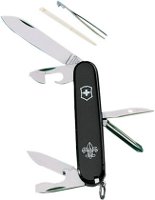 The best all-around, most useful knife I have is my Victorinox Tinker with BSA emblem. I use the small blade on it for all my whittling and to carve fire pistons. I've used all the gizmos on it at some point except the wire stripper. :-)
The best all-around, most useful knife I have is my Victorinox Tinker with BSA emblem. I use the small blade on it for all my whittling and to carve fire pistons. I've used all the gizmos on it at some point except the wire stripper. :-)If you don't have one yet, this is a perfect day to get yours. Scoutstuff.org has knives on sale for 25% discount, plus free shipping on orders over $50 - today (12/15) only. Easy way to get your Christmas shopping taken care of for scouts and scouters you know. There's a 21 knife selection, from single blades to multi-tools.
See sale page.
Scout On - and don't cut yourself
| Leave Comment |
 On this hike, it was 5 degrees - see the frost all over my head? :-)
On this hike, it was 5 degrees - see the frost all over my head? :-)I've decided 5 degrees is about as cold as I enjoy being out hiking miles. Colder and the layers of clothes make walking less enjoyable. But, down to 5 and my trail shoes, longjohns and nylon pants, fleece jacket and rain coat, mittens, hat, and scarf work perfectly without being overly bulky. This week it's popped back up to 40 with mist and fog so I've got at least a few more days to hike.
In wilderness first aid, we discuss what time of year is the most dangerous for hypothermia. When your body loses more heat than it can generate for long enough, your core temperature drops, resulting in hypothermia. Often, the first thought right out of the gate is "January!" but then we chat a bit.
Hypothermia can happen any time of year, but the colder the temperature gets, the faster your body loses heat. So, January makes sense. But, in the dead of winter around here with -20° days, we expect cold so we wear parkas, mukluks, mittens, and balaclavas to insulate us. Besides that, and just as important, everything is frozen solid - that means it's not wet. You can hike through miles of snow and stay completely dry.
Staying dry is a great defense against hypothermia. Hiking at a steady rate without working up a sweat, dressing in layers, ventilating your clothes, and wearing rain gear are all good ways to minimize moisture on your skin. Water transfers heat 50+ times as much as air.
So, spring and fall tend to have more wet weather. Which is worse?
After warm summer days, a wet Fall day feels cold so we protect ourselves. A 35 or 40 degree day in Spring feels tropical and people are tempted to go out with inadequate protection - especially youth. When they get wet, real trouble can happen quickly.
Whether heading out for an afternoon hike or a long trek, staying warm and dry should be part of your preparation.
The cold won't kill ya - the wet will.
Scout On
| Leave Comment |
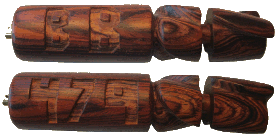 Yet Another Eagle Scout - yesterday was his ceremony and I gave him this fire piston which I carved. The kit is from wildersol.com.
Yet Another Eagle Scout - yesterday was his ceremony and I gave him this fire piston which I carved. The kit is from wildersol.com.You remember Hannibal Smith's favorite line on A-Team? "I love it when a plan comes together." You usually hear it right after everything goes completely wrong and things finally just plop into place, resulting in an unimaginable success. That happens so often in Scouting!
This Eagle went through three or more project ideas, hitting dead ends along the way until Presto! he found a perfect one and nailed it. A couple years ago, he almost couldn't finish a backpacking trip - but the other guys pulled his gear and they all supported him to the end of the trail. Seven years ago, he almost didn't even go on to Boy Scouts. And, now he's an Eagle - and will most likely get a palm next month before he ages out.
Every path taken by a scout is full of failures, from poorly cooked meals to cut fingers to cold feet to slipping knots. Fortunately, the plan of Scouting is very flexible and adapts to unforeseen challenges. After all, the personal challenge really is the plan.
Most new scouts, when I ask them, will readily say their goal is to be an Eagle. No idea how they'll do it, or what it entails, but that's what most of them want. I tell them they can absolutely reach that goal as long as they do two things. First, make a plan - look over what's required and set smaller milestones of how to reach their goal. Second, remember that no plan is ever followed exactly - things will come up, things won't go right, people will let you down, you will make mistakes. As long as they modify and adapt rather than get discouraged, no setback in Scouting will be big enough to stop them from reaching their goal.
It hasn't failed me yet, when looking back over the Scouting career of the Eagles I've known, that every one had obstacles, bumps, detours, and apparent catastrophes. None of them have breezed right through. But in the end, the plan came together because that scout had a goal and kept at it - and THAT is probably the most valuable thing they'll get from that Eagle medal.
Scout On
| Leave Comment |
This is a Sponsored post written by me on behalf of New-Skin for SocialSpark. All opinions are 100% mine.
FCFY - Free Contest For You
Read to the end for the bonus
This Sunday, a scout that I've known since Tigers will be having his Eagle ceremony. Even though I'm not the scoutmaster any longer, he called and asked if I'd say something at his ceremony. I said, "Sure, what would you like me to say?" :-)
Being fairly literal, he said I could mention how he cut himself three years in a row. That's a running joke between the two of us - three years at summer camp he cut his hand or finger with his pocketknife. I've used him as an example in my wilderness first aid courses and when presenting first aid merit badge.
But, he's not unique in his ability to get injured. With 70 scouts in the troop, we've been fortunate to have no serious injuries, but tons and tons of nicks, scrapes, cuts and small wounds that are great for scouts to practice first aid. I bet you have your share of stories from your scouts, too.
Bandaids get sweaty, dirty, soggy, and just plain gross, especially at camp. Besides that, they really get in the way when doing woodwork, cooking, or knot tying.

Here's three products from New-Skin® that are very useful for common scouting problems.
- Liquid Bandage - a super easy, clean alternative to bandaids. Just paint it over a cut and you're good to go. Keeps out dirt and helps the wound heal. It's also useful for preventing blisters by making a protective layer.before the blister forms.
- Poison Ivy Treatment - a foaming soap that lifts, captures, and removes the oils that cause the rash. It also soothes the itching for quick relief.
- Scar Fade Gel - for those injuries that leave a mark. Twice daily application helps minimize the visible scar as the wound heals and is much less intrusive than pads that are often used. I know boys like to show off their scars as they get older (remember Jaws?) but making them less obvious is a good thing.
No matter how careful we are, and how well scouts stay on trails, stuff still happens and having these simple products in your troop first aid kit can make life much better on campouts, hikes, and even at meetings. A 1 ounce bottle takes up little room, but can provide quick, safe care immediately.
There's a cool New-Skin sweepstakes until December 22 where you could win a 4-day adventure. Depending on what you like, it could be the ski slopes of Breckenridge, CO or the warmth of the Botanical Gardens in Atlanta, GA or (my favorite) a hiking trip in Yellowstone! You might need the liquid bandages skiing, but not the poison ivy treatment. In the gardens, the poison ivy treatment might come in handy. But, I'd take them both to Yellowstone.
You must be at least 18 to enter, but it doesn't cost anything.
Please leave a comment here after you enter the contest and say why you want to win the sweepstakes and how you might use New-Skin® products. You can post the url of your sweepstakes page too, if you made one - I'll click on it to give you a vote.
You can get New-Skin® stuff at Wal-Mart and other local drug stores, so it's not a big deal to add them to your home first aid kit, too.

So, you wanna hear the bonus? On Dec. 24, I'll randomly choose one of the comments here from people that entered the sweepstakes and send that person a little whittling knife from whittlerbob.com.
Scout On
| Leave Comment |
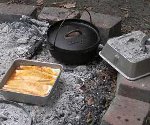 Woody Dutch Oven - As I've used my aluminum Woody dutch oven this year, I've come to really appreciate the lighter weight, easy clean-up, and rectangular shape. My favorite enchiladas fit much better in the rectangular shape.
Woody Dutch Oven - As I've used my aluminum Woody dutch oven this year, I've come to really appreciate the lighter weight, easy clean-up, and rectangular shape. My favorite enchiladas fit much better in the rectangular shape. Since the aluminum doesn't rust, seasoning and oiling isn't so crucial and the low weight makes it easier for scouts to handle. Oh, they also stack nicely and hold coals well.
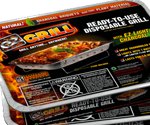 EZ Grill - good idea for an occasional outdoor cooking need. Packs that have a summer cook-out can use a few EZ Grills instead of gathering messy personal grills, charcoal, and fluid, and then cleaning and returning everything.
EZ Grill - good idea for an occasional outdoor cooking need. Packs that have a summer cook-out can use a few EZ Grills instead of gathering messy personal grills, charcoal, and fluid, and then cleaning and returning everything. These disposable grills just light, cook, and recycle the lightweight aluminum shell and bit of paperboard packaging. We had a patrol use one for their open fire cooking and they made great hamburgers.
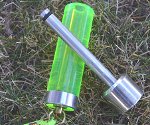 FireLight Fire Piston - Wilderness Solutions has had wooden fire pistons for years and I've carved them for Eagle gifts. They came out with composite pistons a couple years ago and now have a transparent version so you can see the flash of ignition - way cool!
FireLight Fire Piston - Wilderness Solutions has had wooden fire pistons for years and I've carved them for Eagle gifts. They came out with composite pistons a couple years ago and now have a transparent version so you can see the flash of ignition - way cool!Plus, it has a hidden fire steel inside the piston shaft for a 2nd fire starting method bonus.
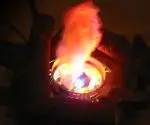 Indoor Campfire - a great prop for winter Pack meetings, den meetings, or any other time when simulating a camping setting is desired.
Indoor Campfire - a great prop for winter Pack meetings, den meetings, or any other time when simulating a camping setting is desired. Our troop just used one for their overnight lock-in just there'd be a flickering light after 'lights out' time. There's no heat because it uses a huge array of LEDs, but the fluttering cloth flame looks hot.
 GeoPalz Pedometer - Since I'll be hiking a couple thousand miles next year, I thought it would be fun to know how many steps I hike. I got a GeoPalz because their website lets you track your steps and win prizes. The goal is to have incentives for youth to get out and be active, and take steps towards a goal. It's small, easy to operate, and very accurate. Wouldn't it be fun to know how many steps a Philmont trek really is?
GeoPalz Pedometer - Since I'll be hiking a couple thousand miles next year, I thought it would be fun to know how many steps I hike. I got a GeoPalz because their website lets you track your steps and win prizes. The goal is to have incentives for youth to get out and be active, and take steps towards a goal. It's small, easy to operate, and very accurate. Wouldn't it be fun to know how many steps a Philmont trek really is?Scout On
| Leave Comment |
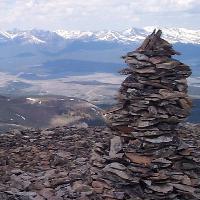 I'd like to elaborate on two points that came up in the comments of my last post - and thank you for all your thoughts.
I'd like to elaborate on two points that came up in the comments of my last post - and thank you for all your thoughts.Cairns vs. Art
Some people mentioned that rock cairns are useful for marking the trail so the rock stack I found should be left alone. The rock stacks were most definitely NOT cairns. The trail is manicured and so encompassed by forest that a person would need to work at getting off the trail.
Rock Art does not adhere to the ethics of Leave No Trace. Some of the specific LNT items to consider are:
- Use a map and compass to eliminate the use of marking paint, rock cairns or flagging.
- Leave rocks, plants and other natural objects as you find them.
- Do not build structures, furniture, or dig trenches.
- Respect other visitors and protect the quality of their experience.
If a person subscribes to the LNT philosophy, then piling rocks isn't something that person would do. It is something we should be teaching youth not to do when we have the opportunity.
There is certainly a place for rock art, and nature art in general. Some people make a living from it - see Andy Goldsworthy. But, we shouldn't be building artworks in the wild, or on public lands, and leaving them for others to observe after our hike.
Building Cairns
Cairns are definitely useful in some areas. Many land management groups build and maintain cairns to mark the trail, similar to blazes on trees. For example, see this cairn construction page. A group spends time removing unofficial cairns and rock art to improve the usefulness of the maintained cairns.
In a pristine environment, hikers should have the opportunity to feel like they are the first explorers. No trail markings are needed through an area with no trail. Cairns in a pristine area may concentrate traffic to a specific path, creating a trail counter to LNT philosophy, rather than dispersing traffic to keep the area pristine.
In an area with established trails, cairns or blazes made by the responsible land agency are adequate. Individuals adding to them can cause confusion and unneeded visual impact.
Here are a couple other pages you might review - Leave what you find, LNT Blog
If you are a proponent of LNT, please take care in how the philosophy is shared with others. You can do it reasonably in an effort to help others understand the value, or this way - http://www.youtube.com/watch?v=Jdfr9x8M8Vw
Scout On
| See 1 comment | Leave Comment |
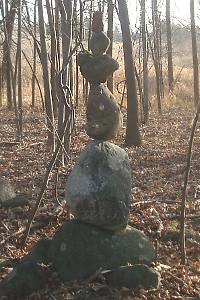 After my hike last weekend, I'm pondering something. I found this, and a few more, balancing rock formations that someone created along the trail. I think they look pretty neat and I've seen them done as art before.
After my hike last weekend, I'm pondering something. I found this, and a few more, balancing rock formations that someone created along the trail. I think they look pretty neat and I've seen them done as art before.The quandry comes from the location of this person's efforts. It is in a state park and along a well-trafficked trail. Most people come here, I believe, to walk through the woods and enjoy the natural beauty around them. None are expecting man-made artistic structures along the trail.
So my perceived dilemma is, should I admire the rock pile and leave it as I continue my hike, or should I take off each rock and toss it out into the woods?
The first response recognizes the efforts of the person and leaves the art for others to enjoy because it really does look pretty cool. The second puts more importance on the natural beauty and feeling that the wilds are unspoiled, and also supporting the minimal impact and leave no trace ethics.
If I were to encounter this in a wild area, my choice would easily be made to dismantle the structure. In my view, the wilds should remain as natural and wild as possible and man-made impacts should be removed.
But, this was along a frontcountry trail where folks hike for an hour or so and there are rest benches, toilets, water fountains, and picnic tables in the area. For all I know, it's possible this art was approved by the land manager to make the trail more interesting. After all, lots of other people have walked past them and left them there.
In this case, I left them alone but have sent an email to the Department of Natural Resources contact to ask what they would prefer to have done with them.
Whatever the response (I'll let you know), I do hope we all agree that it is not our place to create artistic sculptures, structures, drawings, or whatnot out in the public wild places. Minimizing our impact and allowing future visitors to experience as wild and natural a place as we enjoyed is our duty.
Would you have taken the rock piles apart or left them for others to enjoy?
Scout On
| Leave Comment |
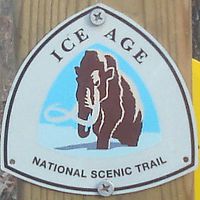 After just researching, planning, and training for the past few months, I finally set foot on one of the national scenic trails I plan to thru-hike in 2012. Over Thanksgiving break, I got a taste of the trail by hiking the Kewaskum and West Bend segments of the Ice Age Trail plus the connecting routes between them. It was just 14 miles with on-and-off drizzle but was a wonderful hike!
After just researching, planning, and training for the past few months, I finally set foot on one of the national scenic trails I plan to thru-hike in 2012. Over Thanksgiving break, I got a taste of the trail by hiking the Kewaskum and West Bend segments of the Ice Age Trail plus the connecting routes between them. It was just 14 miles with on-and-off drizzle but was a wonderful hike!The volunteers that maintain those segments have done a great job. Along the way, there were four or five placards that described the terrain from the glaciers, the people that created the trail, and other interesting tidbits. If the rest of the trail has such kiosks, and well-marked routes, it will be a wonderful trek.
I did notice that someone had vandalized some of the trail signage - what a shameful way to waste money, effort, and time put out by volunteers to improve life for all of us.
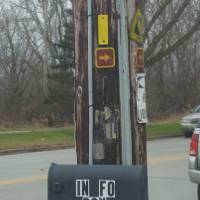 Not all the trail blazes are easy to find, though.
Not all the trail blazes are easy to find, though.Walking down a sidewalk in West Bend, I could have easily walked right past this pole if not expecting the cut-off into the forest. I found that I got tuned into keeping an eye out for yellow blazes and had no problems.
I stopped at a gas station for a Snickers bar and almost asked the clerk if he knew about the Ice Age Trail just to see. I can see I'll have to work on being a bit more outgoing with strangers to get the most fun out of these hikes. Just a bit over 3 months before I start for real.
Scout On
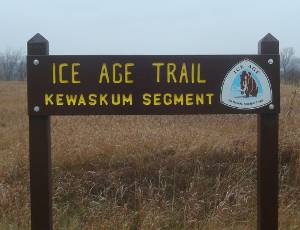
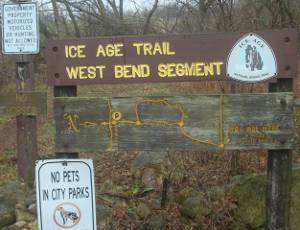
| Leave Comment |
 When the dreary drudgery of indoor scout meetings during the long winter months start getting to your scouts, remember that poor weather means a perfect opportunity to develop teamwork. Sure, it's discussed at Troop Leader Training and the Patrol Leader Council agrees that it's important, but how about incorporating some team development activities into those gatherings when it's too dark, too cold, and too wet to enjoy being outside?
When the dreary drudgery of indoor scout meetings during the long winter months start getting to your scouts, remember that poor weather means a perfect opportunity to develop teamwork. Sure, it's discussed at Troop Leader Training and the Patrol Leader Council agrees that it's important, but how about incorporating some team development activities into those gatherings when it's too dark, too cold, and too wet to enjoy being outside?They don't have to be complicated to be fun. Here's a few that the SPL might want to give a shot:
- Knot Tying
- Glow Rings
- First Aid Relay
- Silly Olympics
- Exercise Relay
- Telephone adn Bullhorn
- Group Push Up
- Newspaper Basketball
- Bowline Race
- Chair Building
- Eye Witness
- Group Morph
- Hidden Route
- Ball Horde
Scout On
| Leave Comment |
Comments:
Â
Feb 25, 2023 - Joe Patterson
Mar 16, 2023 - Adam John
Jan 21, 2024 - Johnna Downing
Scouting 2024  -  Ask a Question  -  Add Content
Just for Fun: Socializing merit badge




Â
Â
Â
Â
Find more Scouting Resources at www.BoyScoutTrail.com
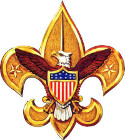


 Follow Me, Scouts
Recent Comments